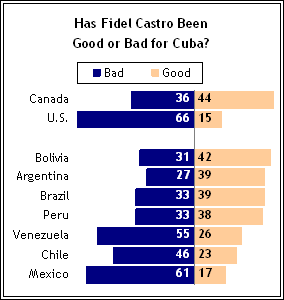by Richard C. Auxier, Research Assistant, Pew Research Center
Fidel Castro ends his long tenure as president of Cuba with international opinion mixed on the question of whether his leadership has been good or bad for his country. While Americans have an overwhelmingly negative view of Castro, attitudes in many Latin American countries are far more favorable to the longtime Cuban leader. The Pew Global Attitudes survey in the spring of 2007, for example, found that pluralities in Bolivia (42%), Brazil (39%), Argentina (39%), and Peru (38%) think Castro has had a positive effect on his country.
Opinion in Canada is also positive towards Castro, with 44% saying that his leadership has been good for Cuba, the highest percentage among the nine countries surveyed about Castro. Even there, however, opinion is mixed, with 36% saying he has been bad for his country. Figure

Criticism of Castro in Latin America is most intense in Mexico (61% negative vs. 17% positive) and Venezuela (55% negative vs. 26% positive), where clear majorities see his leadership as harmful to his country. Chile is the only other country in Latin America where the balance of opinion is more negative (46%) than positive (23%).
While Venezuelan president Hugo Chavez, an ally of the former Cuban president, retained the confidence of more than half of his people at the time of the Pew survey, even those who support Chavez have a mixed view of the Cuban leader. Only 43% of Chavez supporters say Castro has been good for Cuba, while 30% say he has been bad.
Well before Castro resigned as president this week (February 19), it was known that he was suffering from a severe illness. In July 2006, Castro handed over power temporarily to his brother, Raúl Castro, and a few younger cabinet ministers, after he underwent emergency abdominal surgery. According to the New York Times many Cubans long ago accepted the fact that he would never be able to return to power fully.1
With Castro’s health in question, respondents to the 2007 survey were asked whether conditions in Cuba would improve, worsen, or not change when Castro died. Very few voice the opinion that Cuba would be worse off, but in no country — including America — does a majority state that the country would improve following Castro’s exit. In the United States, Mexico and Chile — three countries with highly negative views of Castro — pluralities of four-in-ten (40%) say things would get better in Cuba once Castro passes away. Nearly as many, however, believe Castro’s death will not make a difference (34% in the U.S. and Chile, 28% in Mexico).
In all nine countries surveyed on the question, more people say conditions in Cuba will improve after Castro than say they would worsen, although in four countries (Canada, Argentina, Bolivia, and Brazil) a plurality expresses the view that Castro’s death would not change things much. Brazil is the most pessimistic country, with 24% saying conditions would deteriorate in Cuba after Castrol died, but that was still less than the 26% that say that things there would improve. Only 9% of Americans say conditions in Cuba would worsen after Castro’s death, the lowest number of all countries surveyed.




